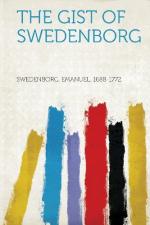Conspicuous in Swedenborg’s thought all along was the premise that there is a God and the presupposition of that whole element in life which we call the spiritual. As he pushed his studies into the fields of physiology and psychology, this premised realm of the spirit became the express goal of his researches. Some of his most valuable and most startling discoveries came in these fields. Outstanding are a work on The Brain and two on the Animal Kingdom (kingdom of the anima, or soul). As his gaze sought the soul, however, in the light in which he had more and more successfully beheld all his subjects for fifty-five years, she eluded direct knowledge. He was increasingly baffled, until a new light broke in on him. Then he was borne along, in a profound humiliation of his intellectual ambitions, by another way. For when the new light steadied, he had undergone a personal religious experience, the rich journals of which he himself never published. But what was of public concern, his consciousness was opened into the world of the spirit, so that he could observe its facts and laws as, for so long, he had observed those of the material world, and in its own world could receive a revelation of the doctrines of man’s spiritual life.
It was now, for the first time, too, that he gave a deep consideration to the condition of the Christian Church, revealed in otherworld judgment to be one of spiritual devastation and impotency. To serve in the revelation of “doctrine for a New Church” became his Divinely appointed work. He forwent his reputation as a man of science, gave up his assessorship, cleared his desk of everything but the Scriptures. He beheld in the Word of God a spiritual meaning, as he did a spiritual world in the world of phenomena. In revealing both of these the Lord, he said, made His Second Coming. For the rest of his long life Swedenborg gave himself with unremitting labor but with a saving calm to this commanding cause, publishing his great Latin volumes of Scripture interpretation and of theological teaching at Amsterdam or London, at first anonymously, and distributing them to clergy and universities. The titles of his principal theological works appear in the following compilation from them. Upon his death-bed this herald of a new day for Christianity solemnly affirmed the reality of his experience and the reception by him of his teaching from the Lord.
Swedenborg died in London, March 29, 1772. In 1908 his remains were removed from the Swedish Church in that city to the cathedral at Upsala, where they lie in a monument erected to his memory by the Swedish Parliament.
William F. Wunsch.
Documents Concerning the Life and Character of Swedenborg (3 vols.) 1875-1877, R.L. Tafel, is the main collection of biographical material; The Life and Mission of Emanuel Swedenborg, 1883, Benjamin Worcester, and Emanuel Swedenborg, His Life, Teachings and Influence, 1907, George Trobridge, are two of the better known biographies.




